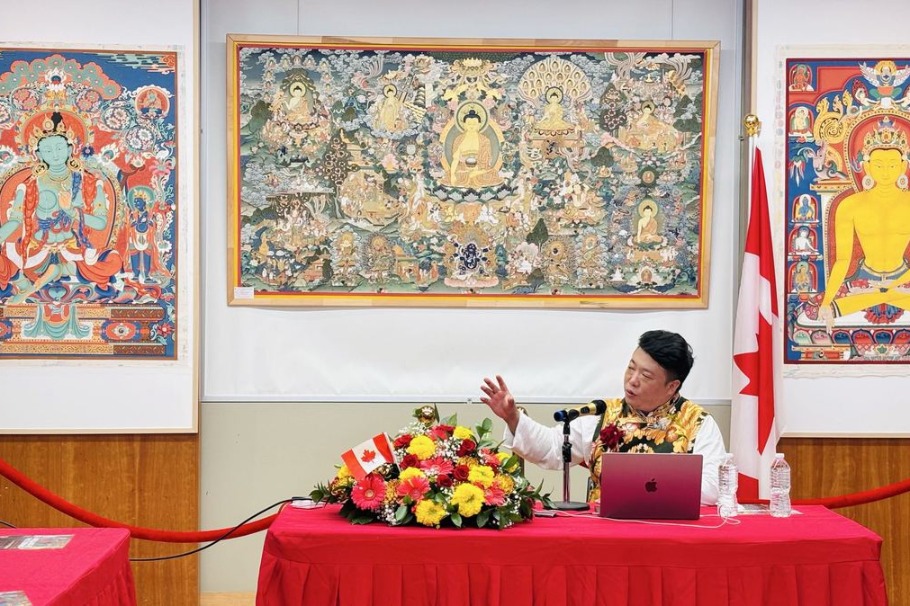Lib Dems to push for electoral reform with newfound influence


In a triumphant night for smaller parties in the United Kingdom's general election, the Liberal Democrats celebrated their best-ever result, emerging as a fresh power in British politics.
The Greens increased their representation from one to four seats in Parliament, the new right-wing Reform party secured five seats, and seven independent candidates gained entry to the national legislature.
But it was a damaging election for the Scottish National Party, or SNP, who are now down to nine members of Parliament from the 48 won in 2019, marking its worst performance in a general election for more than a decade.
Liberal Democrats leader Ed Davey described it as a "record-breaking" night for his party, which reclaims its position as the third-largest in Parliament.
Davey said on Friday morning: "I am humbled by the millions of people who backed the Liberal Democrats to both kick the Conservatives out of power and deliver the change our country needs."
In light of their newfound influence in Parliament, the Liberal Democrats have pledged to hold new Labour Prime Minister Keir Starmer to account, with a particular focus on urging electoral system reform.
The Liberal Democrats won 72 seats, which is a gain of 64 from 2019, marking their best performance since the party's formation in 1988, and represents the highest number of seats won by any Liberal party in more than a century.
The Lib Dems, as they are often referred to, successfully ousted multiple Conservative Cabinet members, including the heads of the education, justice, culture, and science departments: Gillian Keegan, Alex Chalk, Lucy Frazer, and Michelle Donelan, respectively.
Notably, the Lib Dems also gained three seats that were formerly held by Conservative prime ministers: Theresa May, Boris Johnson and David Cameron.
The 72 Lib Dems arriving in Parliament will seek to "hold Starmer's feet to the fire on everything", one reelected Lib Dem MP told the Politics Home news website.
"We've already called for an emergency health budget at the start of the Labour Parliament and we'll probably do similar when we return on Tuesday: NHS support immediately," said a campaign insider.
Push for reform
According to Politics Home, the Lib Dems' long-term policy for this Parliament will be to urge Starmer toward reform of the electoral system. The party will be "trying to embarrass Starmer" by asking why he disagrees with Labour's policy on proportional representation, according to a senior member of the party cited.
The Lib Dems overtake the SNP as the third-largest party, a status it hasn't held since 2015. British media reported SNP members as being stunned by the magnitude of their defeat, as many constituencies in Scotland shifted from SNP to Labour.
The SNP has grappled with multiple challenges, including growing supporter frustration over stalled independence efforts, internal conflicts regarding gender reform legislation, and an ongoing police inquiry into the party's financial dealings.
First Minister and leader of the SNP, John Swinney, emphasized the need for his party to rebuild trust with Scottish voters and reconsider its approach to delivering on its "absolute" commitment to Scottish independence.
Swinney described the result, the SNP's worst since 2010, as "very, very difficult and damaging".
Despite garnering significant support, right-wing party Reform UK struggled to translate votes into parliamentary representation, securing only five seats, including party leader Nigel Farage's victory in the Clacton constituency.
The BBC reported the gap between the share of total votes and the share of parliamentary seats won is the largest on record, noting this disparity has prompted renewed calls for reform of the electoral system.
Reform picked up 14.3 percent of the total vote. This measures against 33.8 percent for Labour, 23.7 percent for Conservatives, 12.2 percent for the Lib Dems, 6.8 percent for Greens and 2.5 percent for the SNP.
The Reform and Green parties have been advocates for electoral system change and it will be a prime focus for their party's MPs in Westminster.
Richard Tice of Reform complained on the BBC Radio 4's Today program of the "injustice" that his party had received millions of votes but only five seats in Parliament.
Speaking after his win, Farage said: "There is a massive gap on the center-right of British politics. It is my job to fill it.
"My plan is to build a mass national movement over the course of the next few years, and hopefully it'll be big enough to challenge the general election properly in 2029."
Green breakthrough
The Greens will have more than one seat for the first time and won their largest ever share of the vote. Before this, their best performance in the popular vote was in 2019, with 2.9 percent.
Sian Berry retained the party's existing seat in Brighton and the Greens gained one seat from Labour and two from the Conservatives.
Party co-leaders, Carla Denyer and Adrian Ramsay, both won seats. Green proposals to boost the minimum wage and increase taxation to fund public services won over voters, said Denyer, who gained the Bristol Central seat from Labour.
"The Green party has been the only party being honest about the state of public services in this country, the level of investment that's needed, not shy about talking about how we would raise it, and proud of the fact that we want a more inclusive society," she said.
"We want a country that is welcoming and takes a humane approach to migration. I think that resonates with so many people in this country."
On electoral reform, Ramsay said he wanted to see a "fairer system" to ensure that "every vote counts equally".
Independent candidates secured seven seats. These included victories in locations where there are sizable Muslim populations, such as in Leicester and Birmingham, won following pro-Gaza focused campaigns.
Independent Shockat Adam caused a huge upset by beating Labour's shadow cabinet member Jonathan Ashworth. Analysis by the think tank More in Common showed Labour's vote share fell sharply in seats with large Muslim populations.
Adam said he is not a single-issue MP, and will fight on health services and housing as well as on Gaza policy.
Sinn Fein is now Northern Ireland's largest party represented in Westminster, after voters in the region turned against the Democratic Unionist party.
The DUP lost three of its eight Westminster seats. Sinn Fein successfully defended all seven of its Westminster seats, maintaining its position as a major political force in the region's 18 Westminster constituencies. Sinn Fein was already the biggest party in local government, and in Stormont, the devolved Northern Ireland assembly.
Sinn Fein maintains a long-standing policy of abstentionism from Westminster. This means that while they contest elections, they refuse to take their seats in the UK Parliament as a symbolic protest against British rule in Northern Ireland.
The Conservative Party has been completely wiped out in Wales, where Labour won all but five of the 32 constituency seats, with four held by left-leaning nationalist party Plaid Cymru, and one by the Liberal Democrats.
































